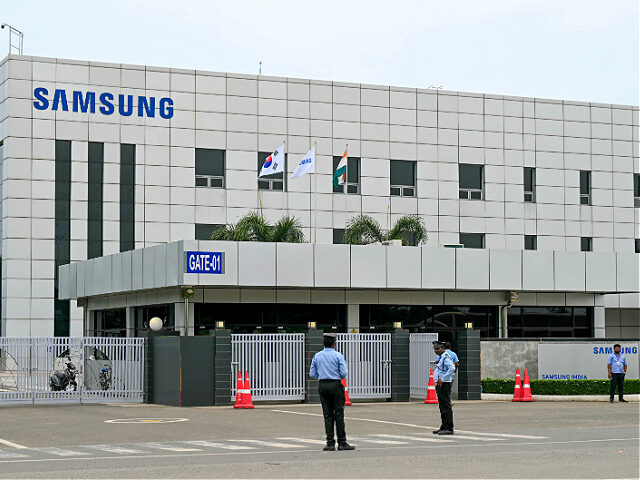Police in Chennai, India, detained 104 striking employees of the local Samsung Electronics plant because they were allegedly planning to hold a protest march without obtaining proper permission.
District senior police officer K Shanmugam said permission for the protest march was required because there are schools and hospitals that would “become totally paralyzed,” and the protesters would likely “disturb public peace.”
“We have detained them in wedding halls as all of them can’t be in stations,” he said.
The Center of Indian Trade Unions (CITU), a powerful labor group, said it would proceed with a protest march on Wednesday despite the arrests. A dozen other union groups said they would support the protests.
“This is an archaic move by the state government,” CITU regional deputy general secretary S. Kannan said of the 104 detentions.
Most of the detainees were released late on Monday. Video from Chennai showed the detained workers, most of them still wearing Samsung company uniforms, being transported by bus to and from the wedding hall where they were held.
By subscribing, you agree to our terms of use & privacy policy. You will receive email marketing messages from Breitbart News Network to the email you provide. You may unsubscribe at any time.
Samsung’s plant in Chennai primarily makes appliances, including refrigerators, laundry machines, and television sets. The factory has about 1,800 employees and contributes about a third of Samsung’s $12 billion in annual revenue from India.
About a thousand of the plant’s workers went on strike last week, erecting a large tent outside the factory for that purpose. The workers want higher wages, better hours, and company recognition for their CITU-backed union.
“For 16 years, these workers have been without a registered union, but the management’s attitude, prudishness, abusive practices, and workload have prompted the workers to form a union,” said a strike notice posted by the workers.
The average wage at the Samsung plant is currently about 25,000 rupees ($300) per month. The workers want the average increased to 36,000 rupees ($430) over the next three years.
The striking workers also complained that the Samsung factory relies too heavily on cheap labor from casual workers and apprentices and is therefore producing at only 25 percent of its full capacity.
Samsung, which is based in South Korea, is planning to cut costs by trimming up to 30 percent of its overseas staff. The company is also reportedly wary about endorsing a union with national backing, such as the CITU would provide.
CITU mostly represents automotive workers at the moment but wants to expand by organizing more tech workers. Until now, strikes like the one at the Samsung plant have been rare in the electronics industry.
For its part, the government of Indian Prime Minister Narendra Modi is nervous about how an escalating labor dispute could hinder the “Make in India” initiative, which seeks to persuade more foreign manufacturers to relocate their operations from China to India.
Some international companies grew nervous about depending on China after the Wuhan coronavirus pandemic, so they decided to diversify their supply chains by moving some production facilities to other countries with comparable labor and regulator advantages, such as India and Vietnam.
China grew enraged by these “decoupling” strategies and began applying pressure against foreign corporations, unsubtly hinting that if they shifted too much production to other countries, they might lose some of the benefits Beijing has been giving them. A compromise of sorts was reached this year as multinational corporations stilled their talk of decoupling and introduced the “China Plus One” concept instead.
China Plus One is really just a watered-down form of decoupling that sounds less threatening to the Chinese Communist regime. The idea is that instead of shifting operations out of China completely, foreign companies would just open a few extra backup facilities here and there.
India is very determined to become the “plus one” of choice for supply chain diversification over the next few years, so the Modi government is watching events in Chennai carefully.

COMMENTS
Please let us know if you're having issues with commenting.